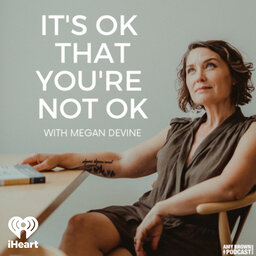Why Do We Celebrate Trauma (aka: Resilience)? with Dr. Gabor Maté
Did anyone teach you that understanding your grief is the key to being (or becoming) a healthy human being? Probably not.
In this expansive episode, Megan speaks with world-renowned author and physician Gabor Maté about the role of trauma and grief in our personal lives and in society at large. Dr. Gabor Maté on grief, this week on It’s OK that You’re Not OK, the podcast.
In this episode we cover:
- What is “personal agency” and why does losing personal agency create disease?
- Why calling grief a disorder has social, relational and political ramifications
- How do elephants grieve? Is it really so different from humans?
- Women as the emotional shock absorbers for the rest of the world
- Why we often ignore other peoples’ pain to make ourselves comfortable
- Does taking pain seriously make you more hopeful?
- Dr. Gabor Maté’s conversation with Prince Harry (!)
Follow our show on Instagram, Facebook, Twitter, and TikTok @refugeingrief and @itsokpod on TikTok. Visit refugeingrief.com for resources & courses
About the guest:
Dr. Gabor Maté is a renowned speaker and author, with expertise in trauma, stress, addiction, and child development. He’s the NYT best-selling author of The Myth of Normal, the award-winning In the Realm of Hungry Ghosts, and many other books. Find him at drgabormate.com
About Megan:
Psychotherapist Megan Devine is one of today’s leading experts on grief, from life-altering losses to the everyday grief that we don’t call grief. The best-selling book on grief in over a decade, Megan’s It’s Ok that You’re Not OK, is a global phenomenon that has been translated into more than 25 languages. Her animations and explainers have garnered over 75 million views and are used in training programs around the world. Find her @refugeingrief
Additional resources:
Check out Megan’s best-selling books - It’s OK That You're Not OK and How to Carry What Can’t Be Fixed
Books and research mentioned in this episode
- The Myth of Normal by Gabor Maté
- Scattered Minds by Gabor Maté
- The Wisdom of Trauma - documentary exploring Gabor Maté’s work to understand the connection between illness, addiction, trauma, and society.
- Jaak Panksepp researched connections between human emotion processing and other mammals
- Hold Onto Your Kids by Gordon Neufeld & Gabor Maté
- Research on early trauma in elephants
- The Washington Post article about Megan’s loss
- NYT Mothers are The ‘Shock Absorbers’ Of Our Society
- Article on Hillary Clinton’s traumatic family history
- NYT Fighting Maternal Mortality Among Black Women
Books and resources may contain affiliate links.
In 1 playlist(s)
It’s OK That You’re Not OK with Megan Devine
Life is full of difficult things, from tiny everyday disappointments to life-altering events. Everyo…Social links
Follow podcast
Recent clips

Protecting Your Mental Health in the Healthcare Workplace, with the Burned Out Burnout Expert, Dr. Jessi Gold
37:29

Over and Over Again: Illustrator Aubrey Hirsch on the Power of Storytelling
39:19

Untangled: Suffering & The 8-Fold Path with Koshin Paley Ellison
1:02:51
 It’s OK That You’re Not OK with Megan Devine
It’s OK That You’re Not OK with Megan Devine